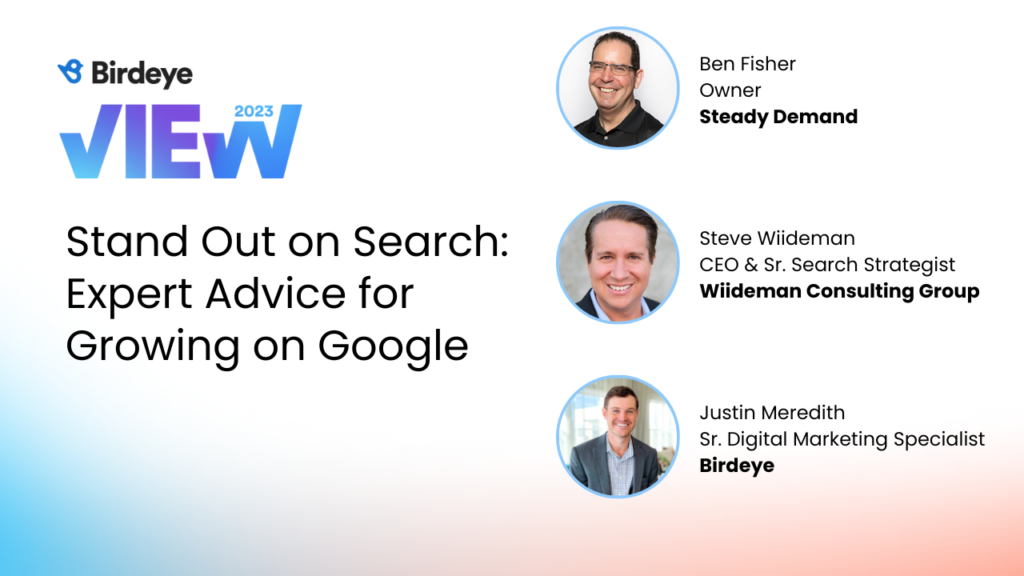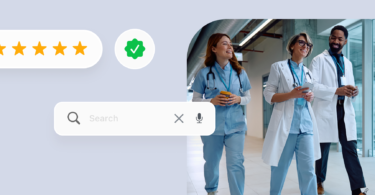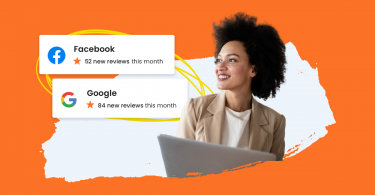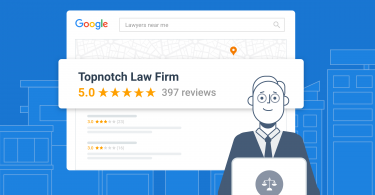A recent Birdeye study revealed that Google reviews make up 79% of all online reviews, showcasing the platform’s growing popularity to an all-time high.
Another study on the state of Google Business Profiles showed that verified profiles:
- Get 84% of views from related local business searches on Google
- Receive about 200 clicks per month on their profile
- Record about 100 monthly visits from interested clients
These data points indicate that establishing a stronger presence on Google is imperative for all businesses.
Birdeye, as a premier Google partner, has always worked to make Google an effective channel for businesses. In our Birdeye View conference, we conducted a panel discussion between Google experts Ben Fisher and Steve Wiideman to gather tips on growing faster on Google.
This blog post summarizes their expert advice and gives you a glimpse into the impactful session.
Key takeaways from the “Expert advice for growing on Google” session
- Today, customers are increasingly turning to online sources to find business. Irrespective of what your local business does, it’s important to establish a strong online presence on listing websites such as Google, Amazon, Bing, and more.
- Optimizing your Google My Business listings is a key strategy for generating free website traffic and significantly increasing conversions.
- Elevating your search rankings through Google My Business ensures that your business appears prominently to potential customers, surpassing competitors in visibility.
- Dedicating time to build product, service, and location-based pages can influence customers to choose your business over competitors who may not be making these efforts.
- AI technologies, like Bard, have not had any impact on rankings yet. But they can be immensely helpful in ideating content and improving your web presence.
- It’s crucial to review all your AI-generated content to ensure that it caters to users rather than merely targeting search engines.
Watch the whole conversation for more valuable insights here:
Full transcript of the “Expert advice for growing on Google” session
Justin: Welcome to today’s session “Stand out on search: Expert advice for growing on Google”. My name is Justin Meredith, and I’ll be your moderator. In this session, we’re going to talk about a few things that you can do to stand out on Google, not just stand out for your customers but also stand apart from your competition.
It is time for me to introduce our guests, Ben Fisher and Steve Wiideman. Ben is the co-founder of Steady Demand – a company specializing in local SEO and Social media. He’s also a Google My Business Diamond product expert and a writer for notable platforms like the Local Marketing Institute and contributes to the influential annual local ranking factor study.
Steve is the CEO and Senior search strategist for Wiideman Consulting, specializing in SEO strategy. Steve has over a decade of experience in consulting for various Enterprises and renowned brands. In addition to that, Steve also contributes in academia as an adjunct professor at UCSD and CSUF.
“With a little bit work and nurturing, organic SEO from Google Business Profile can bring long lasting free traffic.”
Steve Wiideman
Let’s go ahead and Dive right in. Let’s talk about why showing up on Google is valuable. I think everyone here could agree that showing up higher on search is a good thing, but just how important is that now?
Steve: We used to joke around about how the phone books are dead. Nobody’s using a phone book anymore, so if there’s still kind of a phone book mentality of some older generation business owners, this is the perfect opportunity to listen to the voice of reason.
They should get in that mindset that I need to be online, whether on Google, Bing, DuckDuckGo, Amazon, or wherever your business is and people are searching for your products and services.
It’s a perfect time to think about where that gap is, and it’s free traffic if you think about it.
If you do a little bit of upfront work and maybe a little bit of nurturing, water, and sunlight, that’s some pretty good long-lasting traffic when it comes to organic SEO.
Think also about the brand awareness side of showing up on Google. Even if it’s a query somebody makes that isn’t specifically for one of your products and services, but they have an interest or an affinity to what you do, there’s an opportunity there to get in front of them, to build your loyalty program, to grow your email opt-in list, to get more social media subscribers so that your reach continues to extend.
We have one brand we work with. They make literally over 20 million dollars a year from the free traffic they get from Google simply by creating content that solves what their customers are looking for on their website. It all plays into an integrated marketing strategy that supports one another, but even then, that organic side of search has so much value.
Whether you’re just a restaurant and trying to figure out how I can get more business to my local restaurant. Well, if you offer takeout and delivery, then for each location that you have, you need a delivery and takeout page that talks about that service.
This is so when someone’s performing a search for maybe breakfast delivery near me, it’s your restaurant that shows up with that delivery page.
So there are lots of opportunities to drive free traffic, and if you haven’t already started exploring where those opportunities are. Get with a digital marketing consultant see what that gap looks like, and get a prediction or a forecast of what it could mean to your business.
Ben: I’ll just throw one thing out there, Justin, and thank you, Steve. The fact is about 91% of searches happen on Google. So if there is a local intent search to find a business or a restaurant, you should own those results because Google owns those results. By doing video, rich media, tweeting, images, and YouTube, you can still dominate that. So when somebody is searching for your brand, the first thing they see is you and not your competitor.
“”AI technologies like Bard do not currently impact search results. They are good to get quick answers and ideate content, but it is currently just an add-on to your overall strategy.”
Ben Fisher
Justin: I love it. I would like to talk about the current state of Google and how the landscape has changed since the boom of AI over nine months ago. What impact has AI had on search and what role is Bard playing? What are you guys seeing out there right now in the current landscape?
Ben: Not much, Justin. You know it rolled onto the scene in November and in January with chat GPT and the hype went to amazing levels. There were thousands of apps created, and people were trying to figure out. People were saying oh my god, SEO is dead, and SEO is far from dead.
What we’ve learned over that time is that whether it is the Bing AI or Bard or Google Chat, Chat GPT, or Claude, these systems – the large language machines, basically LLMs are nothing but computers doing computer stuff.
It is great assistance, they can give you answers in a very quick manner, but it doesn’t really get rid of the fact that you need to pay attention to your digital footprint. It’s just an add-on, basically is how I see it, and I think how a lot of people in the marketing industry are starting to see it.
So, I’m gonna say not much, what do you think, Steve?
Steve: I think it’s the perfect playground for nurturing ideas to inspire what you could be doing in local marketing. The results themselves haven’t officially shifted. You can absolutely test them out in Google Labs (labs.google.com) and opt-in to try the new generative AI. I think you’ll see the beautiful little chat prompt show up and the chat results in your query so you can see where your business stands with the chat and without.
I think that’d be really helpful for you to at least get a forecast of what could happen in the next six to 12 months. But more than anything, I think the tools that are available give us so many great ideas for content and for keywords.
Just getting in there and even just doing some searches for ways that “I can use AI to help my SEO” is a great place to start.
Just simply ask what are some things that I could do to improve SEO for my Plumbing business, and law Firm business, and they’ll give you a lot of really good ideas.
“90% of local intent transactions happen through local search. So if you’re not paying attention to your Google business profile, you’re not paying attention to 90% of potential leads.”
Ben Fisher
The other thing you could do is ask what pages should I be creating on my website to get free traffic from search engines like Google. You can ask those questions and come up with some really good topics and ideas and things that could inspire, motivate, and even streamline your content marketing process.
After six months, you might start to get a lot more phone calls, emails, and chats on your website. So just something to start with and goof around with, but in terms of what you see in the results, as Ben said, right now, you don’t really see anything unless you’ve opted into Google Labs or if you know a few folks who are starting to use chat CPT and Bard.
One thing I would do there is just go and see where you exist if you exist, and if you don’t talk to somebody who can help make sure that you do exist when more users start to use those platforms.
Ben: To touch on one point there, you said Steve is it’s great for contact ideation, but because of the way that large language models work where they’re basically trying to guess letter by letter, word by word what the intent was or is of what it’s trying to answer for you.
There’s something called hallucination, and when it comes to content, if you ask for a local SEO strategy for a lawyer in San Diego and you ask that same question for a plumber in Phoenix, it will spit out near-exact results.
It’ll infer a little bit of the semantics between a plumber who works on plumbing and a lawyer who works on something else. So, if you don’t put down the rails, it’s hard. So, you have to double-check everything you have to double check all the way.
Justin: Now, Ben, what are your thoughts on Google Business profiles right now as they stand today? What kind of weight do they carry in local search right now?
Ben: Well, Justin, the answer is it’s the same thing, it hasn’t changed much. 90% of local intent transactions happen through local search.
What I mean by that is your average number, beyond the stuff that they’re getting from local service ads and beyond what they’re getting from AdWords.
When you are in the local search pack, the behavior is to click on number one, take a look, click on number two, and maybe click on number three. This is depending on certain factors like the number of Google reviews, ratings, etc, and then they’re going to convert. They’re going to call, and then they’re going to hopefully transact and do actual business with you.
So if you’re not paying attention to your Google business profile, you’re not paying attention to 90% of potential leads that are out there.
“Top four local ranking factors are – accuracy in business information, data visibility, availability of local-intent content, and Google Business Profile optimization.”
Steve Wiideman
What I do like to say is to keep on working on your Google Business Profile. There are new things that are happening all the time, and it’s going to keep on getting better. And as we kind of roll into the end of the year, right around October-ish, GBP will start rolling out tons of new features and even more things into the SERPs.
One thing I want to say is that if you have a possibility of ever being in suspension, get your house in order, and make sure that you have everything ready. I can’t tell you why that’s all I’m gonna say because otherwise, you’ll be off Google. But other than that, it’s the same.
Steve: I totally add to that, and I think it’s critical to have a mindset of what we did do as a business in the last 30 days. But just getting with the team, even if it’s just 10 minutes a month, everyone on your team and discussing – “Hey, we know most of our business is going to come from word of mouth and from Google. What have we done in the last 30 days as a team to improve our presence in search engines like Google?”
Justin: So, what are some of those major ranking factors that impact local search outside of the Google business profile?
Steve: It’s a great question, and there’s a lot of information online, there’s a lot of studies that experts have done, and we’ve found at Wiideman, and it all centers around four specific disciplines, four things that are sort of unbreakable laws of SEO.
- First, your business information must be accurate to the tee. So that Google and other search engines know that when you say your business is at this location, they can verify that because they’ve looked in major web databases such as, you know, data axle and Foursquare and locales. They verified it by looking at the Telco and the telephone company, and they just know that your business is where you say it is when you fill out your Maps profile.
- Second is your data visibility. As Googlebot, bingbot, and Apple Bot are crawling the internet, one of the things that they’re going to be looking for is how often we are finding this business information. Every time your business name, address, and phone number are found by a web crawler around the internet, you earn a point. So we want to make sure we’re in all those industry directories, we’ve got social profiles set up with the business information, and we’re in whatever governments, business directories, and industry directories that we can get in. Those are super important.
- Third is going to be the actual page that you are using to optimize your Google presence, particularly in the map pack. When somebody clicks on a website, the information on that page has to be the same information that you used when you filled out your Google business profile. We did a study at weideman.com, we found that some 107% competitive advantage exists if you can create some really localized content for each location.
- The last one you know is around your business profile optimization and reputation. As you get into that actual profile and fill out every available field, just make sure you’ve used all the available space that’s in there. And that you’re staying active with it. Nobody’s going to click on your results if the reviews and ratings you’re getting aren’t very impressive. The relevancy of your content, the popularity of your brand, and the way that users interact with your listing when they see it in the search results would apply to local results.
Nobody will click your listing if you’ve got one star or if you’ve got even four stars but two ratings, and your competition has four and a half stars and 300 ratings. So, it’s really important to pay attention to the quality, quantity, and velocity of ratings and reviews that you’re receiving in that Google Business profile.
So, every month I sit with my team and ask:
- Did we improve the visibility of our business online with our name, address, and phone number?
- Did we improve the accuracy of our data?
- Did we improve the quality, helpfulness, usefulness, and conversion rate of our local pages?
- Are we improving the quality, quantity, and velocity of ratings that are coming from Google and other rating websites?
Ben: As far as Google business profile goes, the short skinny straight answer to ranking factors is
- Name of your business
- The address
- Categories and subcategories to a certain point
- Reviews
- The services area of your GBP.
You’ll find rankings within 72 hours when you change service areas, so do that well.
Steve: You don’t need to stuff keywords in there, especially in your company name. You might see your competitors doing it, and that’s okay, just hit the flag and report them. But keep your business name and address consistent.
Justin: Yes, given this current landscape, we know the factors that impact local ranking, and we know how important a Google business profile is. We definitely have a better idea now of what impact we can expect from AI.
So what would you advise local businesses to do to stand out on Google?
Ben: So the quick tips would be:
- Updating your Google business profile. Make sure you consistently upload photos to GBP, especially as it is important to get them out there.
- Next, services are an important ranking factor. You must have keywords in your services and the title, even if it is not there in the description. Ensure you use the right words and keywords that make sense to the user.
- It is also important to focus on short-form video content. The reason why I’m saying this is because Google is going to be moving towards generative AI. They have come forth and stated that they are going to look at short-form video content like TikTok etc and YouTube shorts.
- Also, write for users and not for Google.
Steve: Yeah, I couldn’t agree more. I think the important way to focus on what your strategy is going to be is to start by having this originality mentality. I see a lot of folks that want to take shortcuts, I don’t know why it’s still happening.
You’re using AI now to generate content for your website. It gives you some really good inspiration on the things you should be writing, but just copying and pasting verbatim won’t work. At some point, search engines are going to be able to identify that in the same way that I can identify it with my students at UC San Diego and Cal State Fullerton.
Always make sure your content is original, and you can do that by sharing video testimonials from your clients by sharing authentic pictures and media that was created on client sites.
“The top three tips to stand out on Google are to list accurate service areas, optimize local pages for keywords, and create original content such as videos, images, and testimonials.”
Steve Wiideman
I think originality is going to make us stand out more than anything else.
As we think about ways that we can get into some of the new search results, I think focusing on content that you can share with others on your website contributing to online communities and places where you can get recognized and become an authority. That really helps, especially small businesses.
In such cases, you’ve got an expert running that business, and if that expert’s sharing content and referencing content from their own website, that can make such a huge difference.
Also, testing is vital. The more you can test things that improve the helpfulness of your content, visibility, and how your website looks in the search results, the better it is.
Businesses can do this with frequently asked questions, star ratings, videos, or images that provide helpful context that goes into the search result itself. Work with your web developer to do that, and use the Google Rich snippet gallery for ideas. This helps in showing the search engines that you are a very helpful result, and that’s going to be the differentiator between you and the competition.
For example, if you’re an attorney and you have practice areas listed. You’re going to have a page for every practice area, add videos and, images, testimonials from your clients about why they should stay on your web page and not go back to Google and choose a competitor.
I think those are my three tips or differentiators.
Justin: Awesome. Being able to handle all of this is a lot easier said than done, especially if you’re a business that has a lot of different locations and you’re trying to manage everything in one place.
That’s why just recently, at Birdeye, we released a flurry of new updates that kind of integrate AI into a lot of these processes. Right from when it comes to review generation, review responses, and review summaries, make sure you know to pull those insights from your reviews and customer feedback.
This helps understand what your customers are actually saying about your business.
One of the key features is we’ve integrated it with a large language model to where now you can have review responses written in a human-like way where they can analog where it can analyze the review that was written and respond to it personally.
You always have the option to review it, edit and then publish it. You don’t ever want to just trust it completely, you always want to make sure you quadruple-check everything that’s AI-generated.
But it can help with rephrasing a review response that you’ve already written, as well as translating it into different languages. It can also help with your social media listings, ensuring your information is accurate and managing that information.
We also have insights from customer feedback in the form of surveys. There’s a lot we’ve just put out, and we’re coming out with more.
We are at the end of our time, so thank you guys for being here and sharing your insights.
Grow on Google with Birdeye View
Birdeye View is a power-packed first-of-its-kind user conference from Birdeye with the sole aim of helping local businesses grow faster on search engines like Google. Each session had experts in the field sharing valuable insights that can truly transform how businesses operate.
Sign up for the webinar and get started on your growth strategy today!

Originally published









